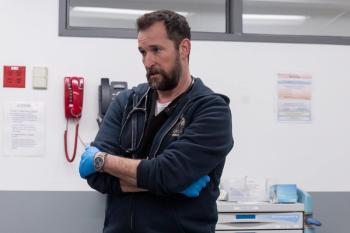
It’s National Nurses Week, and many nurses don’t feel valued
In an interview with Chief Healthcare Executive, Anne Dabrow Woods of Wolters Kluwer talks about ways to address the nursing shortage.
At a time when many nurses have expressed frustration with the profession, Anne Dabrow Woods said she’s more enthusiastic about nursing than ever before.
Woods, the chief nurse of Wolters Kluwer’s Health, Learning, Research and Practice business, talks bluntly about the problems facing the profession. But she said she is excited because, “We have a voice now.”
“I think this is absolutely the best time to be a nurse,” Woods said. “We have issues but people are listening to us. This is our time to really articulate what we need to move forward for the profession’s sake but also for our patients’ sake.”
In an interview with Chief Healthcare Executive, Woods, who has 38 years of experience as a nurse, talked about the shortage of nurses and why it’s likely to get worse. Many healthcare leaders have said they have struggled to keep nurses.
Healthcare organizations aren’t offering enough support to nurses, Woods argued, echoing a sentiment offered by many nurses in recent months. Some nurses are leaving hospitals because they don’t feel valued and don’t feel protected. Healthcare organizations also need to do a better job of retaining the nurses who have invested years in their institutions and training new nurses.
As National Nurses Week aims to honor nurses, Woods called on the healthcare industry to make substantial changes to the profession.
“The nursing shortage has a great potential to get even worse over the next few years, unless something is done to stop it,” Woods said. (The story continues after the video.)
Lack of support
Most nurse leaders are projecting the nursing shortages to get more severe, according to an April
Even before the arrival of COVID-19, analysts forecast a nursing shortage. Woods pointed to pre-pandemic projections of a need for more than 1 million additional nurses by 2030.
However, the COVID-19 pandemic has accelerated the nursing shortage.
“With the pandemic, nurses are really exhausted. They’re burned out. They feel they’re not valued or appreciated by their organizations,” Woods told Chief Healthcare Executive.
“Frankly they don’t feel they have a safe work environment in a lot of institutions,” she said. “And that's another big catalyst for getting people to leave.”
Many nurses don’t feel safe because there simply aren’t enough nurses working at the bedside, she said. During the pandemic, some nurses have moved into different roles.
Some veteran nurses have opted for retirement, and the age of today’s nurses points to the potential for an even greater shortage in the not-too-distant future. Nearly half of all registered nurses are over the age of 50, according to a
“The first thing we need to address is having an adequate number of competent nurses at the bedside,” Woods said. “That absolutely has to be addressed. And if we don’t do that, we’re never going to have a safe work environment and nurses are going to continue to leave.”
Some state legislatures are looking at mandated nurse staffing levels, but Woods said the better solution is for the healthcare industry to find ways to make changes without state laws.
“If the nurses felt safe and felt they had an adequate number of competent staff working beside them to care for the number of patients they have, you wouldn’t see this big push of going to the state legislatures and asking for mandated staffing ratios,” Woods said.
Retention and recruiting
Some hospitals and health systems have offered bonuses of $10,000 or more to fill vacant nursing positions.
Healthcare organizations need to invest more in keeping the nurses they have on staff, Woods said.
“The key thing for healthcare organization leaders is to really start addressing not only the recruitment issue but also the retention issue,” Wood said. “They have to be equally important.”
Healthcare organizations can look to retention bonuses, and some hospitals are doing that, Woods acknowledged.
But hospitals need to offer higher salaries for nurses, she said.
Some nurses have been leaving hospitals for positions as travel nurses, where they have been paid anywhere from $5,000 to $20,000 per week, according to the report issued last week by the U.S. Department of Health and Human Services. Before the pandemic, hospital staff nurses earned about $1,400 per week. (Some hospitals have asked Washington to investigate to determine if staffing agencies are
Hospitals are going to have to pay more to keep talented nurses, Woods said.
“You have to address the salary issue,” Woods said. “If you address the salary issue, you’re going to get people to come and you’re going to get people to stay.”
Hospitals also need to be talking more regularly with their nurses to understand their needs. Surveying nurses when they resign is too late, Woods said.
In addition to dealing with issues of pay, healthcare organizations need to offer opportunities for nurses to move up in the organization, or at least laterally into other positions, Woods said.
Hospitals also must do a better job in training nurses for leadership positions, she added. Some are elevated into supervisory positions but aren’t given the training to succeed.
When those nursing leaders struggle in those new positions, often they walk away, she said.
A good nurse is not necessarily a good manager.
“We happen to promote a lot of good clinical nurses into these leadership positions but yet we don’t give them the training and the experiences they need to flourish in these positions,” Woods said.
“We have to take the time to invest and train these people,” she said.
Training young nurses
Healthcare organizations need to spend more time training young nurses, Woods said. Many don’t get the training they need when they start and throw in the towel.
She said as many as 24-30% of new nurse graduates who enter a healthcare organization leave after the first year.
“That’s crazy, right? Because they haven’t been supported,” she said. “They feel like they’ve been thrown into a situation, they weren’t adequately supported.”
Some recent graduates didn’t get time working in a hospital setting due to the COVID-19 pandemic, Woods said.
A 12-week orientation program for new nurses isn’t sufficient, Woods said.
“We have to look at how we’re onboarding these new graduates and do it differently,” Woods said.
She pointed to the need for hospitals and health systems to offer one-year residency programs for newly graduated nurses.
“Hospital organizations that have nurse residency programs tend to keep new nurses longer than those who don’t,” she said.
Nurse residency programs are common at academic institutions and larger systems, she said.
While it may be more challenging for smaller hospitals to offer similar residency programs, Woods said hospital leaders should look at it as a long-term investment.
“The bottom line is you have to think about return on investments,” Woods said.
“On the back side, you’re not going to have the attrition you would have if you didn’t have a nurse residency program.”
Showing gratitude
While hospitals have endured staffing and financial challenges, all health systems can show their nurses they are valued.
In some cases, it simply means showing appreciation, Woods said.
“Organizations that really stepped up and demonstrated they valued their clinicians and nurses, and really had that sense of gratitude, when they knew it was a bad day, the leaders would come up on the unit and say, ‘Thank you for everything you’re doing,’” Woods said.
“Those nurses tend to stay because they feel their organization values them.”





























































































